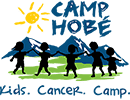Q: What do the kids do at summer camp?
A: Both in-person and virtual programs provide activities to help participants learn healthy coping mechanisms to better their psychosocial wellbeing, through grief work and emotional support during challenging activities. We offer a variety of activities, including many that are just like any other camp, such as crafts, nature, field games, drama, poetry, music, hiking (in-person camp), archery (in-person camp), campfires, and free play. We also provide Hobé Forever, a program that gives campers a structured way to express grief and loss in a safe environment.
A: In-person Camp Hobé is a place where children can challenge their mental and physical strengths by participating in outdoor activities such as high ropes, swimming, and many more.
Q: Are the activities safe for my kid?
A: We have many safety rules in place and use protective gear when needed. Our volunteers are trained in safety and emergency plans before camp starts. Some activities require additional precautions (archery) or release forms. The volunteers and staff are constantly evaluating the campers to ensure that they are able to safely participate.
Q: Do they take special precautions for patients?
A: We are careful with all the campers, whether they are patients with cancer (or similar disorders) or healthy children. Our volunteers are given training on the special needs of patients and taught signs that may suggest a patient is becoming ill (neutropenic, low platelet count). Volunteers and medical staff constantly evaluate campers to ensure that they may safely participate.
Q: Are the patients with cancer (or similarly-treated disorders) allowed to swim?
A: Yes. The pool at Camp Hobé is closely supervised by our medical staff and also meets all safety and licensing requirements of Tooele County. Patients with cancer (or similar disorders) may swim, but must report to the Infirmary right after the activity for line checks and dressing changes (if needed). The medical staff will not allow a camper to swim if they feel it is not in the camper’s best interests, based on their current state of health.
Q: Will my children be assigned to the same cabin group?
A: Not necessarily. Groups are assigned by age and gender identity, in order to meet the physical and psychosocial needs of our campers. Siblings of the same gender identity who are close in age (no more than a year and a half apart in age) may be assigned to the same group, although we cannot guarantee this. Groups may be assisted and supervised by staff/volunteers of the same or opposite gender identity at any time, based on camper needs and staffing levels.
A: This is a good thing! Most campers need – and enjoy – the chance to spend time with their peers. Each camper gets individual attention from counselors, whether they are a patient or a sibling. Each camper creates special memories to share with their siblings at mealtimes, all-camp events, and after camp.
